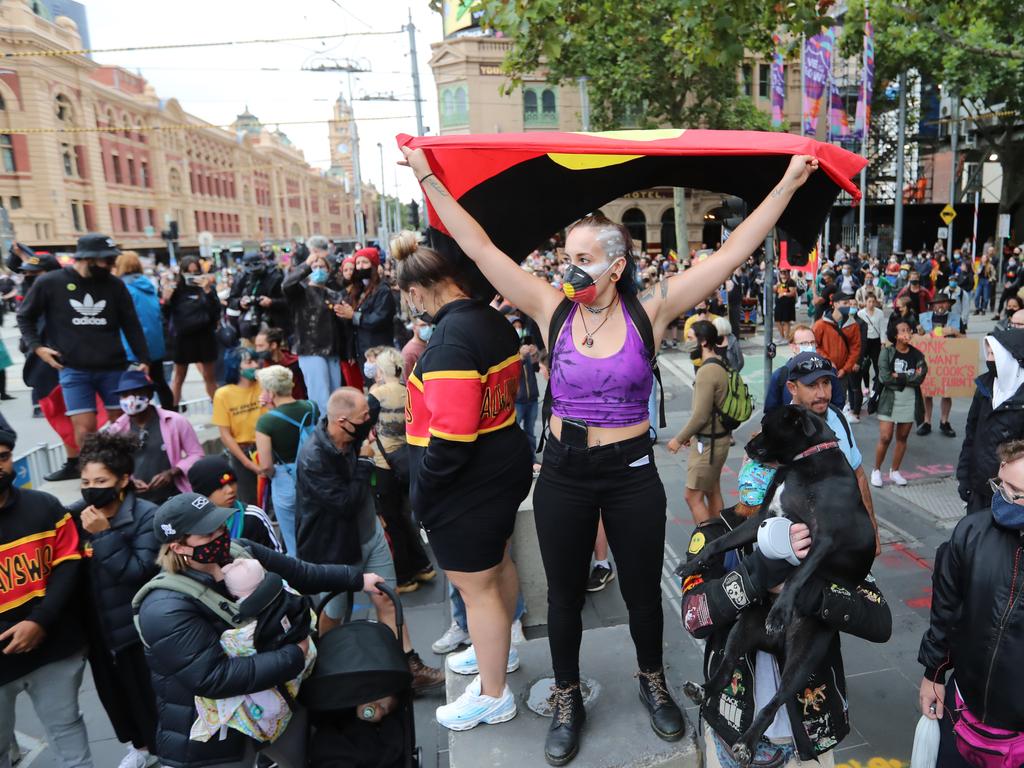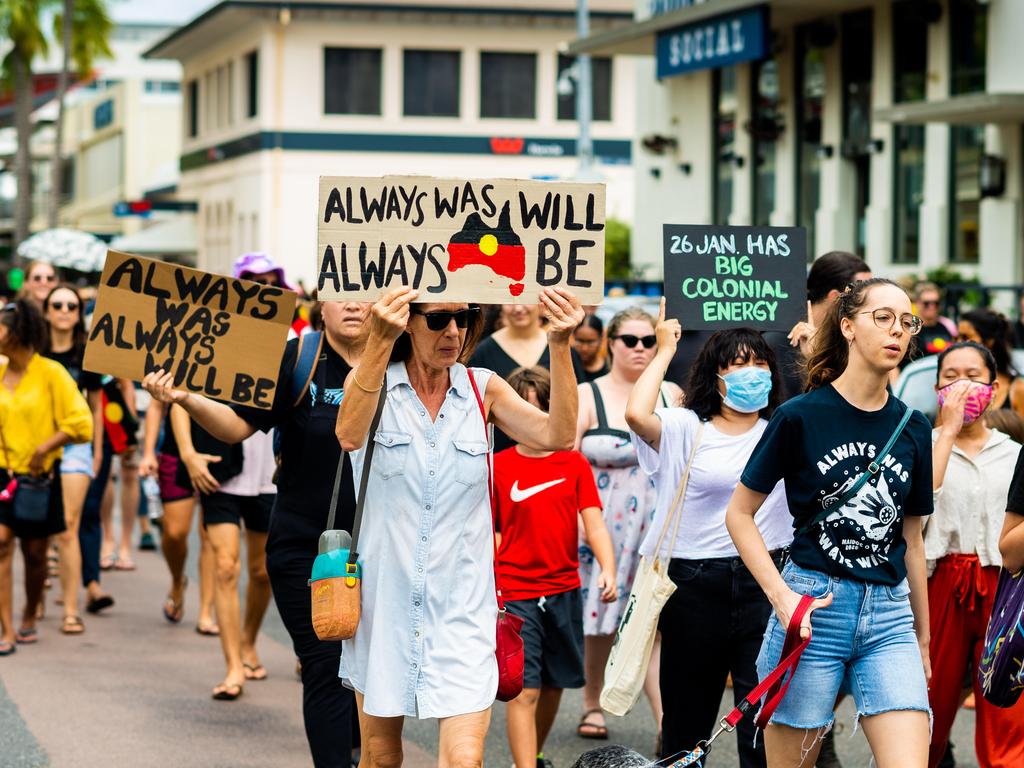‘Australia grapples’: World reacts to national holiday outrage
Australia was in the global spotlight overnight as publications from the BBC to the New York Times had their say on Invasion Day rallies.
Publications across the globe have covered the Australia Day protests that saw thousands of residents across the country rally against what many describe as “Invasion Day”.
But there was a distinct angle in most overseas coverage that accompanied the news: COVID.
Publishing powerhouses from the BBC to the New York Times covered the rallies, which saw thousands unite in Australia’s capital cities and in regional centres despite repeated calls fro government and authorities not to engage due to the ongoing pandemic.
In total, upwards of 50,000 people may have marched, according to estimates, calling for a change to the January 26 Australia Day holiday.

RELATED: Anthony Albanese’s Australia Day plan slammed
The largely peaceful protests turned ugly as police clashed with some rally goers with several people arrested. You can read the full story here.
For global readers, many still in the grip of the pandemic, headlines including “Thousands defy Covid rules in protests” and “Thousands expected to protest Australia Day despite COVID-19 concerns” led the way for some heated discussion.
The date of Australia Day, January 26, remains controversial as it marks the day the First Fleet sailed into Sydney Cove in 1788 formally declaring the land as British despite Indigenous peoples having lived on the land for centuries.
Australia Day, a holiday marking the arrival of the British, has been reframed by protesters as Invasion Day. The demonstrations, which draw attention to the brutal colonization of the continent, were bolstered by the Black Lives Matter movement this year.https://t.co/5G7132mK2O
— The New York Times (@nytimes) January 26, 2021
Australia Day: Thousands defy Covid rules in protests https://t.co/qV4tYBjU48
— BBC News (World) (@BBCWorld) January 26, 2021
RELATED: ‘Changing Australia Day date won’t help Indigenous people’
While the BBC spent much time inside the piece explaining how the day is “controversial as it marks the start of Australia’s colonisation”, the publication’s reporter Simon Atkinson in Brisbane defended the Queensland event as “a masked-up, socially distanced protest”.
“Social distancing was tricky in places,” he wrote. “And even in a city with no known coronavirus cases, pretty much everyone followed organiser requests to wear a mask, despite the high temperatures.
Upon seeing those on the “fringes” of the march largely ignoring the calls for recognition, he wrote: “Carrying slabs of beer and dressed to impress, it’s always worth remembering that for many Australians (and a poll this week suggests it’s a vast majority) there’s no real clamour for change, and that 26 January remains a day to party, to see friends and indeed to celebrate.”

RELATED: Arrests as police clash with Invasion Day protesters
China was surprisingly quiet on the issue, except focusing on the breakdown on Australia-China relations.
“Australia’s domestic conservative politics have exacerbated the country’s hostility toward China. Flourishing right-wing conservative forces, growing domestic populism, and white supremacy have given rise to opportunism in Australian politics,” wrote Guo Chunmei, an expert on Australian studies with the China Institutes of Contemporary International Relations, for the Global Times.
“Under such an unhealthy atmosphere, Australia’s attitude toward China has deteriorated sharply.”
The publication had earlier published another editorial cartoon — this time a kangaroo balancing on a rope across a cliff — rebuffing news of Australia’s iron ore export growth despite Beijing cutties ties.
Opinion: Australia's iron ore-driven export growth may not be sustainable in long run, certainly does not deserve‘applause’ for its contribution to offset export declines, especially to China. https://t.co/oZJGRecdxQ pic.twitter.com/tlCIohi19R
— Global Times (@globaltimesnews) January 25, 2021
Meanwhile Reuters and AFP, while leading with “COVID-19 concerns” and “Australians defy coronavirus rules”, spent a large amount of their editorial educating readers abut “the mistreatment of the Indigenous people”.
“Chants of ‘Black Lives Matter’ and ‘always was, always will be Aboriginal land’ rang out during most rallies across the country, television footage showed,” reported Reuters.
“Australia has fared better than most other developed economies in the pandemic, with just under 28,800 cases and 909 deaths, mostly in Victoria state.”
AFP posted a selection of images while leading with: “Thousands of Australians defied coronavirus rules on Tuesday to protest the country’s national day, held on the anniversary of British colonisation of the vast continent that its Indigenous population marks as ‘Invasion Day’.”
Thousands expected to protest Australia Day despite COVID-19 concerns https://t.co/TnqQ9UtVFe pic.twitter.com/5ZgQ9ZGPQw
— Reuters (@Reuters) January 26, 2021
Thousands of Australians defy coronavirus rules to protest the country's national day, held on the anniversary of British colonisation of the vast continent that its Indigenous population marks as "Invasion Day" https://t.co/tCdHzZPvHQ pic.twitter.com/m21gS7DYJm
— AFP News Agency (@AFP) January 26, 2021
The New York Times provided a blunt headline, but focused on America’s Black Lives Matter movement, which “bolstered” the protests.
“Day of Celebration or Mourning? Australia Grapples With Its National Holiday”, the headline reads.
“Those who celebrate Australia Day, the country’s national holiday, associate it with barbecues and pool parties. But for those who protest against it, it is a reminder of the continent’s brutal colonisation.
“Year upon year, these protests have grown and gained political traction, and Tuesday’s were bolstered by the global Black Lives Matter movement.”
Thousands march in Australia to protest against the mistreatment of Indigenous people https://t.co/oZKGHLQSTE pic.twitter.com/QYox2IE0mU
— Al Jazeera English (@AJEnglish) January 26, 2021
Invasion Day: thousands attend vigils before 26 January protests and marches https://t.co/Une7RhNufl
— Guardian news (@guardiannews) January 25, 2021
The Sun, meanwhile, added a touch of beach and bikinis to its coverage, leading with: “Thousands flock to beaches to celebrate in 40C heatwave as officials urge locals to stay home”.
“Pictures show locals crowded onto scenic beaches in Sydney with large groups ignoring social distancing rules,” wrote reporter Niamh Cavanagh.
“The pictures of the busy beaches showed a stark contrast to the UK over the weekend which saw its snowiest spell in two years.”
Yet despite the COVID fears, news.com.au’s Benedict Brook reported: “Yet the number of arrests could have been far higher but for a last minute pact struck between police and the organisers.
“The main Sydney Invasion Day event passed off without incident with a socially distanced crowd of at least 3000 listening to several hours of speeches on a sweltering 38C day,” he wrote.
“NSW Police said the protest was unauthorised but they negotiated with organisers to divide the large crowd into socially distanced groups of less than 500 people within the park.’
Police had been able to issue on-the-spot fines upwards of $1000 but the penalty for breaching public health orders comes with a fine up to $11,000 and a six-month jail term.
Hard to capture due to the amount of social distancing here at the Domain for #InvasionDay rally in Sydney but wouldn’t be surprised if organisers have exceeded 500 people by some margin. I’m sure they’ll be pleased at the turnout.
— Benedict Brook (@BenedictBrook) January 25, 2021
Thousands across Australia protested #InvasionDay, the country's national day marking the start of British colonization.
— AJ+ (@ajplus) January 26, 2021
Indigenous communities have lived there for over 65,000 years, but face rampant inequality and police abuse.
"You are on stolen land." pic.twitter.com/ehWYnBcMPG
Organiser Ian Brown, a Gomeroi man from Moree, told news.com.au: “The police, given the numbers, were very cooperative so we thank them for that.”
Assistant Commissioner Michael Willing later confirmed the strategy.
“We were able to move a large number of people in and out of that area, let them talk about the issues at their heart, and then dissipate in a way which was as safe as possible,” he said.




